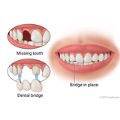Our Health Library information does not replace the advice of a doctor. Please be advised that this information is made available to assist our patients to learn more about their health. Our providers may not see and/or treat all topics found herein.
Topic Contents
Tooth Decay
Condition Basics
What is tooth decay?
Tooth decay is damage to a tooth caused by germs (bacteria) in your mouth. These bacteria make acids that can eat away at layers of the tooth. These include the hard outer layer (enamel), middle layer (dentin), and center of the tooth (pulp). The more layers that have decay, the worse the damage.
What causes it?
Bacteria and food can cause tooth decay. A clear, sticky substance called plaque is always forming on your teeth and gums. Plaque contains bacteria that feed on the sugars in the food you eat.
As the bacteria feed, they make acids. The acids attack the teeth for 20 minutes or more after you eat. Over time, these acids destroy tooth enamel and cause tooth decay.
You may be more likely to have tooth decay if you:
- Don't brush and floss your teeth regularly.
- Don't see a dentist for checkups and cleanings.
- Eat foods that are high in sugar and other carbohydrates.
- Don't get enough fluoride. Fluoride helps prevent tooth decay by making teeth more resistant to acids produced by plaque. Fluoride is added to many public water supplies.
- Don't have enough saliva. Saliva washes away food and harmful sugars, so it helps protect your teeth from decay. A dry mouth may be caused by certain medical conditions, by taking certain medicines, or by breathing through your mouth. If you're older, you're more likely to have a dry mouth.
- Have diabetes.
- Smoke, use spit tobacco, or are around smoke.
Children, whose teeth are still growing, are more likely to have tooth decay than adults. This is because the minerals in new teeth are not very strong and are easier for acids to eat away.
What are the symptoms?
You may not have symptoms until you have a cavity or tooth infection. When this happens, it's common to have a toothache. Your gums may swell near the sore tooth. You might have bad breath or a bad taste in your mouth. You could have white, gray, brown, or black spots on your teeth.
How is it diagnosed?
Your dentist will ask about your past dental and medical problems and care. Your dentist will check your teeth using a pointed tool and a small mirror. You may also get X-rays of your teeth and mouth to find tooth decay that can't be seen with the eyes alone.
How is tooth decay treated?
Treatment for tooth decay depends on how bad it is. If tooth decay is caught early, before a cavity forms, you may be able to stop it by brushing with fluoride toothpaste or getting fluoride treatments.
If the decay has eaten through the enamel, you may need one or more treatments. These may include:
- A filling if a cavity has formed. Your dentist will remove the decay and fill the hole with material. This will restore the tooth to its original shape.
- A crown if the decay is bad and your tooth is damaged. A crown, or cap, replaces part of your tooth.
- A root canal if the pulp of your tooth is infected. The diseased pulp of a tooth is removed.
- Removal (extraction) if the root of the tooth is badly damaged. The dentist may replace the tooth with a bridge or an implant.
How can you prevent it?
- Brush your teeth when you wake up and right before you go to sleep. Use fluoride toothpaste. Floss once a day.
- See your dentist for checkups once or twice a year so problems can be found early.
- Eat healthy foods. These include fruits, vegetables, lean proteins, whole grains, and low-fat dairy products.
- Avoid foods with added sugar, especially certain cereals, desserts, candy, and raisins.
- If you smoke, quit or cut back as much as you can.
- Ask your dentist about fluoride treatments or sealants.
Related Information
Credits
Current as of: July 31, 2024
Author: Ignite Healthwise, LLC Staff
Clinical Review Board
All Healthwise education is reviewed by a team that includes physicians, nurses, advanced practitioners, registered dieticians, and other healthcare professionals.
Current as of: July 31, 2024
Author: Ignite Healthwise, LLC Staff
Clinical Review Board
All Healthwise education is reviewed by a team that includes physicians, nurses, advanced practitioners, registered dieticians, and other healthcare professionals.
This information does not replace the advice of a doctor. Ignite Healthwise, LLC disclaims any warranty or liability for your use of this information. Your use of this information means that you agree to the Terms of Use and Privacy Policy. Learn how we develop our content.
To learn more about Ignite Healthwise, LLC, visit webmdignite.com.
© 2024 Ignite Healthwise, LLC.




